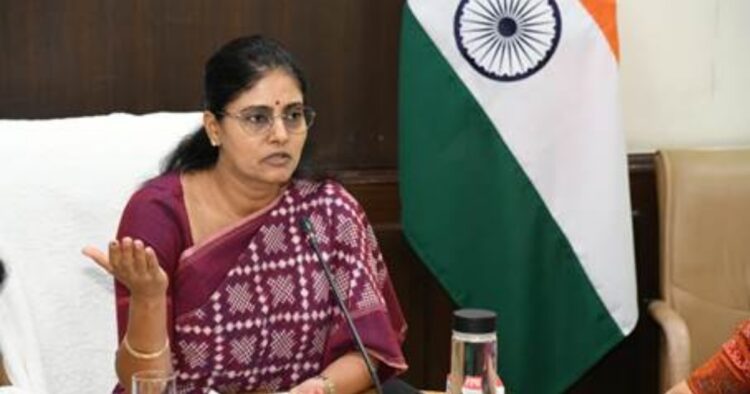Union Minister of State for Health and Family Welfare, Anupriya Patel, emphasized the significance of healthy timing and spacing of pregnancies in a meeting with public health experts. The meeting, held in observance of World Population Day, focused on the theme, “Reaching the Last Mile for Ensuring Healthy Timing and Spacing between Pregnancies: Issues and Challenges.”
Minister Patel highlighted that properly spaced pregnancies can greatly improve the health of both mothers and children. She stated, “Adequately spaced pregnancies can significantly enhance maternal and child health outcomes. This reduces health risks and empowers women and families to make informed choices about their reproductive health.” She noted the government’s achievements in reducing maternal mortality from over 130 to 97 per 100,000 births.
Patel mentioned various government initiatives aimed at improving maternal health, including the Pradhan Mantri Surakshit Matritva Abhiyan (PMSMA), Extended PMSMA, High-Risk Pregnancy identification in PMSMA, Anemia Mukt Bharat Abhiyan, and the Post-Partum Family Planning Programme (Post-Partum IUCD and Post Abortion IUCD). She emphasized that the government’s efforts reflect its commitment to this cause.
She also acknowledged the role of state-level initiatives in involving men in family planning and underscored the importance of effective communication strategies. Patel stated, “The task of achieving Viksit Bharat by 2047 cannot be done without empowering our women. Healthy timing and spacing between pregnancies are very important for women’s health.”
Aradhana Patnaik, Additional Secretary and Mission Director (NHM) at the Ministry of Health and Family Welfare, reported that India has achieved a Total Fertility Rate (TFR) of 2.0, with 31 States and Union Territories reaching the replacement level. However, she pointed out the need for targeted strategies in the five remaining states to achieve this goal.
The discussions during the meeting covered various topics related to family planning services, including the equal participation of men and women, the use of data in family planning, and global best practices. Participants shared their experiences and proposed strategies for future contraceptive options.
Public health experts at the event included Dr. Kalpana Apte, Head of the Family Planning Association of India; Dr. Saswati Das, Sexual and Reproductive Health Specialist at UNFPA India; Dr. Chander Shekhar, Professor and Head of the Department of Fertility and Social Demography at the International Institute for Population Sciences (IIPS), Mumbai; Ms. Moni Sinha Sagar, Division Chief for the Family Health/RMNCHA Division at USAID India; Dr. Somesh Kumar, Country Director at Jhpiego India; Professor Sudha Prasad, Director and Chief of Matritava Advanced IVF and Maternity Centre, Gurugram; and Dr. S.K. Sikdar, former Advisor for Family Planning and Maternal Health at the Ministry of Health and Family Welfare.
Professor Sudha Prasad highlighted various causes of maternal mortality and the importance of adequate spacing between pregnancies. She emphasized the need to provide a full range of contraceptive options to women and couples to reduce the risk of unwanted pregnancies.
Dr. Kalpana Apte discussed traditional gender norms in India and the necessity of male participation in family planning. She stressed the importance of increasing couple communication and engaging men at the grassroots level in discussions about family planning.
Moni Sinha Sagar emphasized the importance of expanding contraceptive choices and introducing new options like hormonal intrauterine devices (IUDs) and vaginal rings. She noted the progress shown in the NFHS-5 data but pointed out ongoing challenges such as high rates of teenage pregnancies and reliance on traditional contraception methods.
All speakers agreed on the importance of providing adolescents with accurate, judgment-free information about contraceptive options to enable informed decision-making and improve access to family planning and reproductive health services.
ALSO READ: “Gujarat Health Crisis: Suspected Chandipura Virus Claims Lives of Six Children”
Minister Patel praised the experts for their dedication and noted that by empowering youth, addressing gender equality in family planning, enhancing couple communication, learning from best practices, and expanding contraceptive options, significant progress could be made.
She stressed the need to identify and target regions with low uptake of family planning services and high unmet needs, and to enhance social and behavior change communication involving frontline workers to achieve desired outcomes.

















Comments